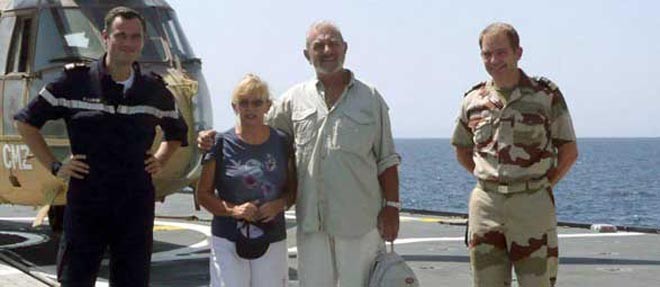French couple tell of pirate attack and commando release
by Sail-World Cruising round-up on 22 Nov 2011

Bernadette and Jean-Yves Delanne after their release by Commandos SW
French couple from Tahiti Bernadette and Jean-Yves Delanne, of the yacht Carre d'As IV, have told for the first time the details of their attack and capture by Somali pirates in September 2008. Six Somali pirates are on trial for the attack, reported by Sail-World at the time (see http://www.sail-world.com/index_d.cfm?nid=48915!story).
They have told how a well-armed pirate flotilla burst out of thick yellow fog in the Gulf of Aden and closed in on their yacht, which was sailing alone...
'There was a sort of ochre-coloured fog in the Gulf of Aden, the sea was calm,' 63-year-old Bernadette told the French court, recounting how the couple arrived in the notoriously dangerous waters on September 2, 2008.
Bernadette and Jean-Yves were experienced sailors, sailing their Amel Super Maramu, a 16m (53ft) ketch towards the gulf, a choke-point on the route to the Suez Canal.
They told of how first a small skiff with a 40 horsepower outboard and only three pirates on board surged out of the gloom and stormed towards them.
Jean-Yves manoeuvred to try to lose their pursuers, but the launch rammed them. 'I was very scared. I screamed. I thought my husband would be gunned down,' declared Bernadette.
One of the boarding party fell in the ocean, but a slight man, 'barely 40 kilos' jumped aboard the Carre d'As and fired at least one shot.
Almost immediately a second launch arrived, along with the pirate's so-called 'mother ship', which the couple said resembled a whaler, each carrying pirates armed with 'rifles, machine guns and rocket launchers'.
Ten gunmen boarded the yacht. One understood navigation and took the helm, plonking a compass down and declaring a 120 degree bearing, in other words: 'Reverse course. We were no longer going to Yemen, but Somalia.'
The pirates seemed delighted with their luxury prize, the couple said, telling of how they used the shower and the toilet, used the sat-phone to call their families and took pictures of each other with the couple's camera.
They demanded that the captives cook for them, but did not harm them.
'My husband said: 'We are 60 years old, married for 40 years. You should respect my wife and respect me.' They never shoved us,' said Bernadette. Jean-Yves said their captors were kind, apart from 'one or two'.
The yacht dropped anchor off a Somali village and a local leader - who has not been captured - came aboard with his translator Yacub, who is now one of the six confused and homesick men on trial a hemisphere away.
The gang initially demanded a four-million-dollar ransom, but the very next day offered a 'two-million-dollar discount', before falling to arguing among themselves for several days, splitting along clan lines.
Some of the pirates eventually decided to move on, setting sail again and taking the couple with them, hugging the coast en route for Eyl, a notorious pirate den on the Somali coast.
There, a 30-man French assault team from the Hubert Commando, an elite frogman commando unit, stormed the yacht, shooting one pirate dead, arresting six and freeing the couple. During the raid, Bernadette hid in a cupboard, and Jean-Yves in the toilet.
'We did the right thing,' she said. 'At least one of the pirates wouldn't have given us up easily.'
French President jubilant:
It was the second time that French Commandos had freed a French yacht, having freed Le Ponant earlier in the year - April of 2008 - and President Sarkozy was jubilant, announcing, 'This operation is a warning to all those engaged in this criminal activity. France will not accept that crime pays.'
However, a third attempt, to free the yacht Tanit in April of the following year, went badly wrong when the skipper Florent Lemacon was killed by friendly fire. His wife Chloe and son Colin were freed.
The six young men now aged between 21 and 36, have been languishing in a French prison since their arrest, and face a life behind bars far from their war-torn homeland if convicted. Their defense lawyers are trying to make a case that they were possibly coerced into participating in piracy, that their economic situation was an impoverished one, and describe how traumatised the young men are, being separated from their families.
If you want to link to this article then please use this URL: www.sail-world.com/91046